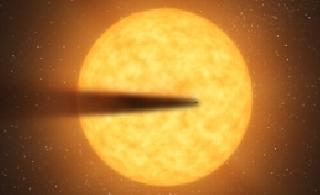
An artist's concept depicts a comet-like tail of the possible disintegrating super Mercury-size planet candidate as it transits, its parent star, KIC 12557548. A NASA/JPL photo
WASHINGTON (BNS): A possible planetary body disintegrating by the searing heat of its parent star has been detected by NASA's Kepler spacecraft.
The super Mercury-sized planet appears to be leaving a dusty tail, similar to a debris-trailing comet, as it transits its host star, named KIC 12557548. The star, smaller and cooler than our Sun, lies 1500 light years from Earth.
Kepler, which detects planets and planet candidates by measuring dips in the brightness of stars as the planets transit or cross in front of them, has detected the new possible planetary body by identifying an unusual light pattern emanating from the star KIC 12557548.
The new-found planet candidate completes its orbit around its host star every 16 hours, making it one of the shortest orbits ever detected.
At an orbital distance of only twice the diameter of its star, the surface temperature of the planet is estimated to be a smoldering 3,300 degrees Fahrenheit (1,816 degrees Celsius).
Scientists hypothesize that the star-facing side of the potentially rocky inferno is an ocean of seething magma. The planet's surface melts and evaporates at such high temperatures the energy from the resulting wind is enough to allow dust and gas to escape into space.
This dusty effluence trails behind the doomed companion as it disintegrates around its star.
The researchers calculate that at the current rate of evaporation, the dusty world could be completely vaporized within 200 million years.
Additional follow-up observations are needed to confirm the candidate as a planet, NASA said.
 Previous Article
Previous Article Next Article
Next Article













The Indian Air Force, in its flight trials evaluation report submitted before the Defence Ministry l..
view articleAn insight into the Medium Multi-Role Combat Aircraft competition...
view articleSky enthusiasts can now spot the International Space Station (ISS) commanded by Indian-American astr..
view article